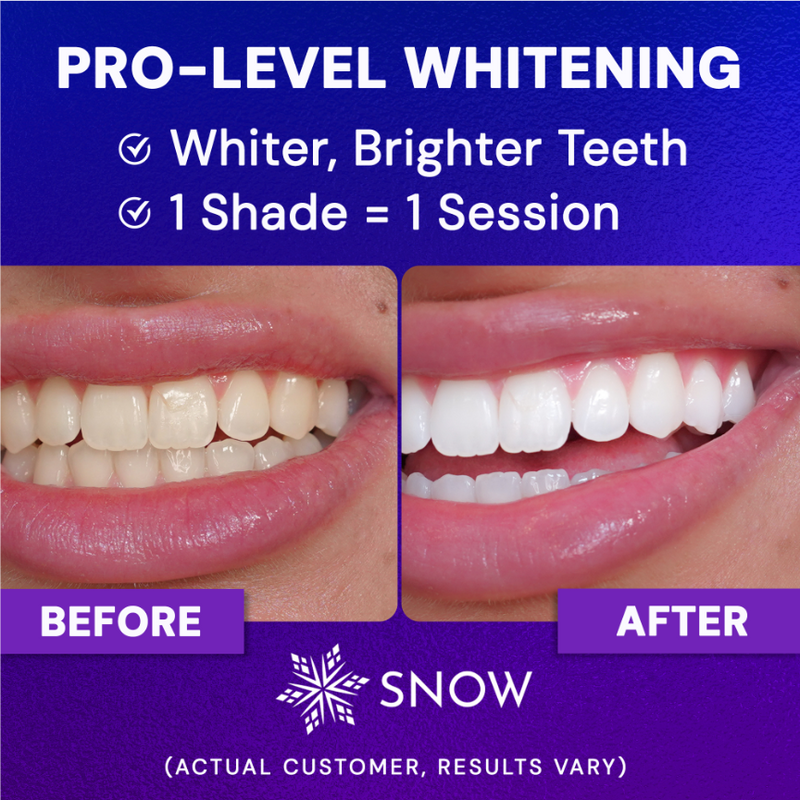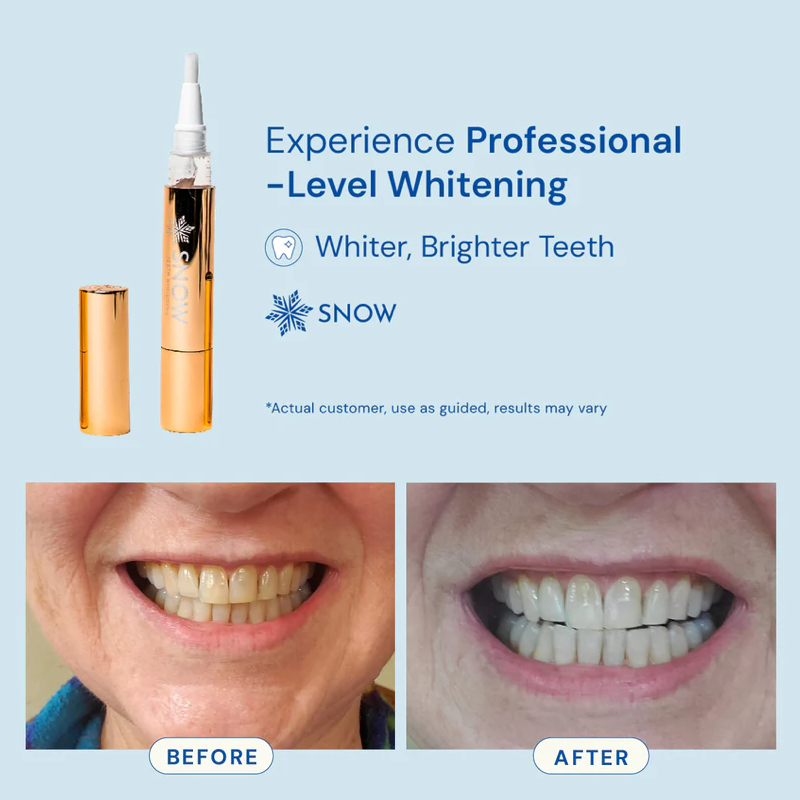Tooth sensitivity and early signs of decay often mean your enamel is losing essential minerals. According to the CDC, over 90% of adults have experienced enamel erosion. If untreated, this can lead to cavities and long-term damage. The good news is that enamel can be supported through a natural process called remineralization. This guide covers effective, science-backed ways to restore enamel through diet, oral care habits, and professional treatments, helping keep your smile strong and healthy.
Key Takeaways
-
Tooth remineralization involves replenishing lost minerals in enamel, which is crucial for reversing early-stage decay and preventing cavities.
-
Saliva plays a vital role in remineralization by neutralizing acids and delivering essential minerals such as calcium and phosphate to tooth surfaces.
-
Effective methods for remineralizing teeth include using fluoride toothpaste, incorporating calcium and phosphate-rich foods, and professional treatments, alongside maintaining good oral hygiene.
What Is Tooth Remineralization?
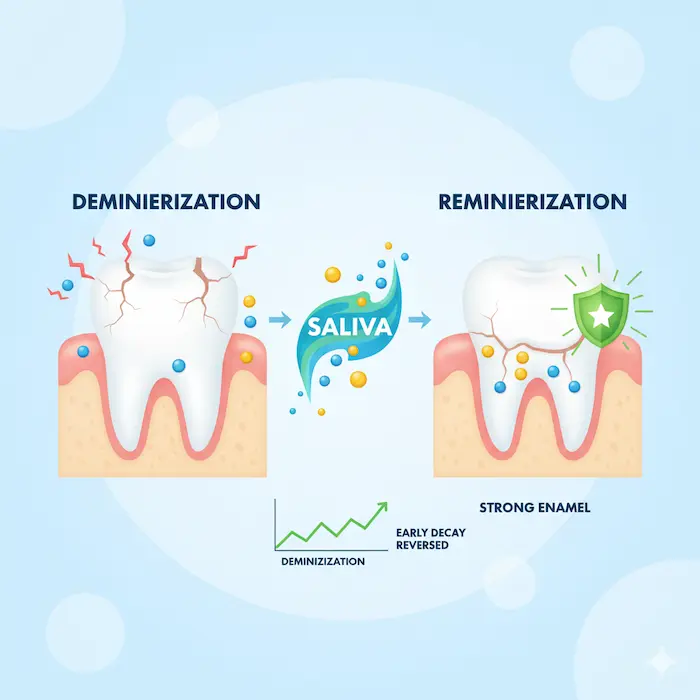
Tooth remineralization is the biological process of restoring essential minerals to the enamel, the protective outer layer of your teeth. This natural defense mechanism plays a crucial role in reversing early tooth decay and maintaining strong enamel health. It helps counteract mineral loss caused by daily exposure to plaque, acidic foods, and oral bacteria.
Enamel, primarily composed of hydroxyapatite, undergoes continuous shifts between demineralization and remineralization. Demineralization occurs when acids erode the enamel surface. In contrast, remineralization repairs damage by redepositing lost minerals such as calcium and phosphate.
If the remineralization process does not keep up, enamel erosion can progress into cavities. According to a 2023 report published in the Journal of Dental Research, early enamel lesions can be reversed if detected before cavitation, particularly with targeted care and mineral-delivery systems.
Tooth remineralization helps reduce sensitivity, rebuild enamel structure, and prevent more serious dental issues. Strengthening this natural process early is key to long-term oral health.
Factors that influence enamel remineralization include:
-
Minerals like calcium and phosphate, which form the crystalline structure of tooth enamel
-
Saliva, which acts as a delivery system for essential minerals and helps maintain oral pH
-
Diet and hygiene habits, which support or hinder your ability to remineralize teeth naturally
Over 96% of adults show signs of enamel erosion according to CDC data. Learning how to take steps to remineralize teeth can help prevent early tooth decay and strengthen enamel before permanent damage occurs.
To better understand how enamel becomes compromised, visit our complete guide to damaged tooth enamel.
How Does Saliva Help Remineralize Teeth?
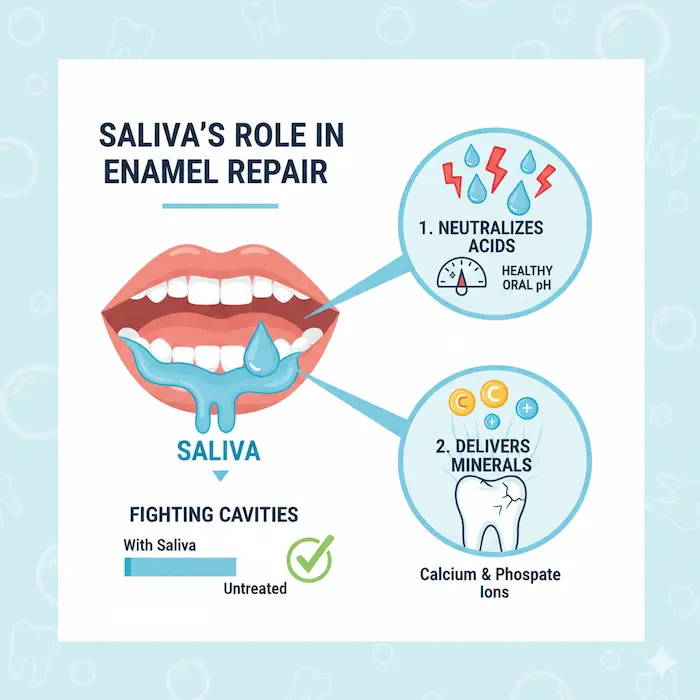
Saliva does much more than keep your mouth moist. It plays a key role in enamel repair by helping to reverse early tooth demineralization. As part of the body’s natural process, saliva delivers essential minerals like calcium and phosphate that help strengthen enamel and protect against decay.
It also helps neutralize acids from plaque and acidic fruits, which can wear down enamel over time. This buffering action is essential to maintaining a healthy oral pH, which supports the remineralization process. When this balance is disrupted, enamel becomes more vulnerable to damage.
According to the CDC, 1 in 5 adults aged 20 to 64 has at least one untreated cavity. Keeping saliva flowing through simple habits like staying hydrated or chewing sugar-free gum can help defend against weakened enamel and reduce the risk of tooth decay.
Saliva’s support for enamel repair is most effective when paired with good oral hygiene. Brushing, flossing, and eating a balanced diet all help create the right environment for natural remineralization.
For added protection, professional treatments like fluoride varnish can reinforce enamel and complement the natural benefits of saliva. These small daily and preventive steps go a long way toward maintaining strong, healthy teeth.
What Are the Most Effective Methods to Remineralize Teeth?
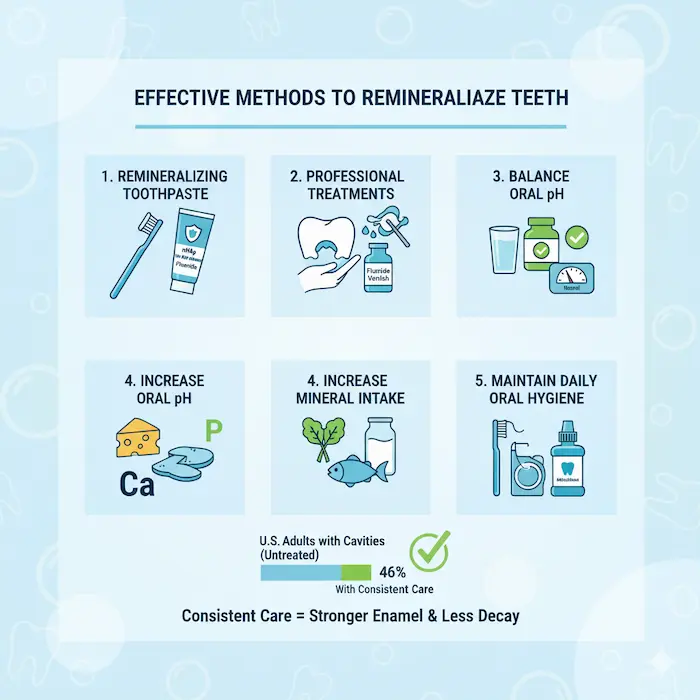
There are many safe and effective ways to remineralize teeth naturally, from at-home solutions to targeted professional treatments. These strategies help restore lost minerals, strengthen enamel, and protect against tooth decay, which affects nearly half of U.S. adults over 30, according to the CDC.
Below are some of the most effective approaches you can start using right away.
Use Remineralizing Toothpaste
Daily use of a remineralizing toothpaste is one of the most accessible and proven ways to promote enamel repair.
Toothpastes containing fluoride or nano-hydroxyapatite (nHAp) help rebuild weakened enamel and prevent future mineral loss. Nano-hydroxyapatite is the active mineral that mimics enamel's natural structure, making it ideal for those seeking fluoride-free options.
Products like SNOW® Magic Whitening Booster Powder, formulated with hydroxyapatite, are designed to whiten while also strengthening enamel.
Strengthen Enamel Daily With SNOW® Magic Booster
Try Professional Treatments
In-office options such as fluoride varnish or prescription remineralizing pastes provide a higher concentration of minerals. These are especially helpful for individuals with visible enamel erosion or recurring cavities.
According to CDC data, community water fluoridation alone saves $6.5 billion in dental treatment costs annually, showing the long-term benefits of mineral-based prevention.
Balance Your Oral pH
Acidic environments weaken enamel over time. Balancing oral pH is key to stopping demineralization and allowing enamel to heal. Reduce your intake of acidic and sugary foods, and rinse your mouth with water after consuming them. Saliva plays a natural buffering role, so staying hydrated and chewing sugar-free gum can support this process.
Increase Calcium and Phosphate Intake
These minerals are essential for the formation and maintenance of hydroxyapatite. Using products containing calcium phosphate compounds, such as specific toothpastes and mouth rinses, helps boost the body’s ability to remineralize teeth. SNOW® Fluoride-Free Toothpaste with Hydroxyapatite offers dual benefits: gentle whitening and enamel support.
Protect and Rebuild Enamel With SNOW® Every Day
Maintain Daily Oral Hygiene
Consistent oral hygiene supports the success of any remineralization method. Brush twice daily, floss, and use a mineral-rich toothpaste. These steps, combined with a balanced diet and professional care, create the ideal environment for natural enamel repair.
To protect your teeth for the long term, start early and stay consistent with these proven methods. Incorporating supportive products and healthy habits can significantly reduce your risk of enamel erosion and improve your oral health.
How Does Diet Affect Tooth Remineralization?
What you eat directly impacts the strength and resilience of your enamel. A nutrient-rich, balanced diet provides the essential minerals your teeth need to remineralize and repair through a process called remineralization. Supporting your oral hygiene routine with the right foods can help reduce harmful bacteria, limit acid exposure, and promote overall enamel health.
Foods That Strengthen Enamel
Certain foods are especially effective at supporting dental remineralization because of their high calcium and phosphate content. These include:
-
Sardines
-
Leafy greens
-
Cheese
-
Yogurt
-
Lean meats
-
Nuts
These enamel-friendly foods help rebuild enamel, enhance tooth structure, and support the body's natural ability to strengthen enamel.
Vitamin D is also essential, as it supports calcium absorption and helps naturally regulate tooth mineralization. Including vitamin D-rich foods like fatty fish and fortified dairy products in your diet can enhance the natural repair process and reduce the risk of enamel abrasion and tooth sensitivity.
To learn more about how diet, minerals, and whitening products affect enamel, read our guide on whether teeth whitening damages enamel.
Avoiding Acidic and Sugary Foods
While eating the right foods can help repair and protect your teeth, it's just as essential to avoid those that do the opposite.
Just as some foods help rebuild enamel, others can contribute to enamel abrasion and erosion. Limiting acidic and sugary foods is essential to protect against enamel demineralization. These include:
-
High-sugar foods that fuel plaque bacteria and bacterial infection
-
Soda and other acidic beverages
-
Citrus fruits and juices
These items increase mouth acidity, which can damage the enamel surface and interfere with the natural repair process.
To support dental remineralization and protect your teeth naturally:
-
Limit acidic or sugary foods and drinks
-
Rinse with water to remove food particles after acidic meals
-
Chew sugar-free gum to stimulate saliva production and help neutralize acids
A diet that supports calcium and phosphate intake, combined with proper oral hygiene, can make a meaningful difference. Use diagnostic tools during dental checkups to monitor your enamel health. Good oral hygiene habits, such as brushing with remineralizing toothpaste and using fluoride mouthwash, help maintain the conditions for remineralization.
Making mindful dietary choices is one of the most effective natural methods to protect and strengthen your enamel over time. Whether you add more fatty fish, try oil pulling with coconut or sesame oil, or reduce food particles between meals, each habit contributes to stronger, healthier teeth.
Is Hydroxyapatite as Effective as Fluoride?
New biomimetic ingredients are changing how we strengthen and repair tooth enamel. These cutting-edge alternatives support the natural process called remineralization, restoring key minerals and reinforcing tooth structure without harsh chemicals.
One of the most promising is nano-hydroxyapatite (nHAp), a mineral that closely resembles the enamel’s natural composition. It fills micro-damage in enamel, reduces tooth sensitivity, and helps rebuild enamel without the risk of dental fluorosis. According to emerging research, it offers a similar cavity-fighting benefit to fluoride.
Casein phosphopeptide-amorphous calcium phosphate (CPP-ACP) is another effective option. It stabilizes calcium and phosphate ions, allowing them to penetrate and repair weakened areas of enamel.
Bioactive glass (BAG) is also gaining traction for its ability to bond with tooth surfaces and release essential minerals during brushing.
These ingredients are especially valuable for those looking to whiten teeth without damaging enamel. They are already used in advanced products like SNOW® Whitening Booster Powder, which combines gentle whitening with strengthening hydroxyapatite.
Do Xylitol and Probiotics Help Remineralize Teeth?
Beyond brushing, simple daily habits can further enhance the body’s ability to protect and repair teeth.
-
Xylitol, found in sugar-free gum, inhibits cavity-causing bacteria and stimulates saliva production
-
Probiotics like Lactobacillus reuteri can help reduce harmful bacteria in the mouth and support a balanced oral microbiome
-
Oil pulling with coconut or sesame oil is a traditional remedy some use to reduce plaque and promote oral cleanliness
These natural methods work well alongside brushing and flossing. If you're switching to more eco-conscious routines, you might also consider whether bamboo toothbrushes are good for the environment.
What Professional Treatments Can Remineralize Teeth?
When enamel erosion progresses past the early stage, professional treatment is often necessary to protect your teeth and avoid long-term damage.
Fluoride varnish, applied by a dental professional, helps strengthen enamel and relieve tooth sensitivity. It’s beneficial for individuals with severe enamel abrasion or high cavity risk.
However, even the most effective dental remineralization agents can only repair early enamel damage. Once a cavity has formed, it cannot be reversed at home and requires dental restoration.
According to the CDC, there are more than 2.1 million emergency room visits each year in the U.S. for dental emergencies. Many of these could be avoided through regular checkups and timely treatment.
Routine dental visits also allow professionals to use diagnostic tools that can detect enamel loss and early decay before they become serious. Paired with at-home care and remineralizing products, professional intervention completes a well-rounded enamel care strategy.
What Are the Most Effective Methods for Maintaining Good Oral Hygiene
Daily oral care is essential for preserving your enamel, preventing cavities, and supporting your mouth’s natural defenses. Here's how to maintain an intense oral hygiene routine:
1. Brush Twice Daily
Use a fluoride or hydroxyapatite toothpaste to strengthen enamel and prevent mineral loss. Brushing at least twice a day helps remove plaque and bacteria that contribute to decay and tooth sensitivity.
2. Floss Once a Day
Flossing clears out plaque and food particles from between teeth—areas that brushing often misses. This reduces the risk of cavities and supports proper oral hygiene.
3. Rinse With Fluoride Mouthwash
A fluoride mouthwash can deliver added protection against enamel erosion and decay, reinforcing vulnerable areas between brushing sessions.
4. Chew Sugar-Free Gum
Chewing gum after meals stimulates saliva flow, which helps neutralize acids and wash away debris. This natural boost in saliva also aids in the remineralization process.
5. Visit Your Dentist Regularly
Professional cleanings remove tartar and allow early detection of enamel issues. Dental visits are also a chance to monitor the effectiveness of your routine using diagnostic tools.
By consistently following these steps, you support your enamel’s natural defenses and maintain a healthy, resilient smile over time.
Final Thoughts
Tooth remineralization is a natural process that helps reverse early-stage tooth decay and strengthen enamel. By adopting simple habits such as brushing with remineralizing toothpaste, improving your diet, and exploring advanced oral care ingredients, you can support your enamel and protect your smile for the long term.
Pairing consistent at-home care with regular dental checkups is key to preventing enamel erosion before it leads to more serious dental problems.
For daily enamel support that also brightens your smile, try SNOW® Fluoride-Free Toothpaste and Whitening Boosters formulated with nano-hydroxyapatite.
Frequently Asked Questions
Have questions about enamel health or tooth remineralization? Here are quick answers to the most common ones.
How long does it take to remineralize teeth?
It typically takes a few weeks to notice improvements in tooth remineralization with consistent oral care and fluoride toothpaste. However, the exact duration can vary based on the extent of demineralization.
Can a cavity be reversed through remineralization?
Yes, remineralization can repair early-stage, non-cavitated lesions, but it cannot reverse cavitated lesions, which need professional restoration. Seeking early intervention is essential for effective remineralization.
Are there any natural remedies for remineralizing teeth?
Yes, natural remedies for remineralizing teeth include dietary changes that boost calcium and phosphate intake, and using xylitol and probiotics, all of which create a conducive environment for enamel repair. Prioritizing these methods can significantly enhance your oral health.
What foods should I avoid to protect my enamel?
To protect your enamel, avoid acidic and sugary foods, including soda, citrus fruits, and high-sugar items. Limiting these foods helps maintain a balanced oral pH and supports enamel health.
How effective are fluoride varnishes in treating tooth decay?
Fluoride varnishes are highly effective in treating early signs of tooth decay by enhancing fluoride uptake and promoting remineralization. Regular applications by a dental professional can also help manage sensitivity and severe enamel erosion.













































